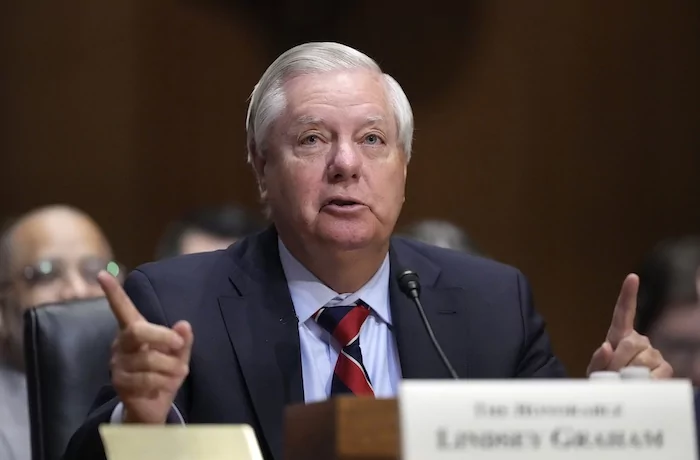

The Senate will move forward with passing its own budget resolution focused on immigration and defense, dealing a blow to House leadership, which wants to see those combined with tax extensions in one big reconciliation bill.
Congress is focused on the major fiscal overhaul that Republicans plan to pass through budget reconciliation, a legislative process that allows for bills to bypass the filibuster and pass with only a simple majority in the Senate. The party has been trying to use the process to extend the 2017 Tax Cuts and Jobs Act and fund border security, among other priorities.
Now Senate Republicans say they will move forward with a resolution just for President Donald Trump’s immigration and defense priorities, leaving the tax portion to be hashed out later.
Senate Budget Committee Chairman Lindsey Graham (R-SC) told reporters after a Wednesday meeting that the Senate has decided to advance its own budget resolution plans after the House Budget Committee has struggled to move ahead with its own resolution. He said wants to get U.S. Immigration and Customs Enforcement the funding it needs to carry out Trump’s immigration agenda.
“I appreciate what the House is trying to do, but I think it’s very important that we get to [Trump border czar] Tom Homan the money he needs to complete the plans that President Trump promised,” Graham said.
Graham said the committee is looking at somewhere around $150 billion for border security and somewhere in that range for defense spending. He also said that roughly $300 billion will be paid for.
“So we will instruct committees, authorizing committees, to go find pay-fors that are reconciliation compliant so that this thing is basically paid for,” Graham said.
The senator said he hopes to start this process as early as next week.
The move shows an increasing insistence from the Senate, and a growing number of deficit-minded Freedom Caucus members in the House, that there should not just be one massive reconciliation bill but rather that the GOP’s priorities should be split into multiple pieces of legislation in order to deliver spending to the border quicker.
House Speaker Mike Johnson (R-LA) told reporters on Wednesday that he is optimistic about the process, despite the move by Graham.
“I’m going to talk to Lindsey, he’s a good friend, and he has to understand the reality of the House,” Johnson said. “It’s a very different chamber with very different dynamics, and the House needs to lead this if we’re going to have success.”
Graham said that he has always believed that “one big, beautiful bill” was too complicated. A smaller bill that separates out tax policy also could deliver an early legislative victory for the president, while forcibly wedding tax policy to immigration and other priorities could cause the process to drag on for months, given the complexity.
“What unites Republicans, for sure, is border security and more money for the military,” Graham said. “It’s important we put points on the board.”
Sen. Ron Johnson (R-WI) also addressed reporters after the meeting. He spoke in support of the Senate moving a resolution that strips out tax.
“So what we’ll do now is provide money for the border, some money for defense, call it a day,” he said. “We’ll see where it goes from there.”
Johnson has also pushed back on the “one big, beautiful bill” strategy, but with a twist. The Wisconsin senator said that Republicans should move three bills — the first addressing the border, the second being a clean extension of the Tax Cuts and Jobs Act, and the third simplifying and rationalizing the tax code while addressing some of Trump’s tax proposals from the campaign.
He also said that the Trump tax cuts should be made permanent — not merely extended with a sunset period, as many of the provisions were in 2017.
“Let’s get it right this time. Let’s not make the mistake of not making it permanent,” Johnson said.
Sen. John Kennedy (R-LA) downplayed the dissonance between the two chambers after the lunch meeting.
“I think we’re going to proceed on the basis of two bills,” Kennedy told reporters. “I don’t see this as a competition, I see this as we’ve got a lot to do in the next year.”
While the House generally prefers the one-bill strategy, with Ways and Means Committee Chairman Jason Smith (R-MO) an ardent supporter, some in the conference have begun to defect to the two-bill camp. Much of that trend arises from demands of trillions of dollars in cuts from some Freedom Caucus members who want to see reconciliation lower the deficit.
“We’re still staring at big deficits. So you know, we need to not increase deficits, pretty bare minimum,” Rep. Chip Roy (R-TX), a Freedom Caucus member, said Tuesday evening.
CLICK HERE TO READ MORE FROM THE WASHINGTON EXAMINER
Sen. Cynthia Lummis (R-WY) also told the Washington Examiner on Wednesday that having reconciliation reduce the deficit on a net basis is “a pretty hard line” for her.
“Now that doesn’t mean that I think I’ll get it on the first bite at the apple, but I would like to see progress towards that goal as reconciliation 1.0, 2.0, and then maybe 3.0 are fleshed out,” she said.
Rachel Schilke contributed to this report.






